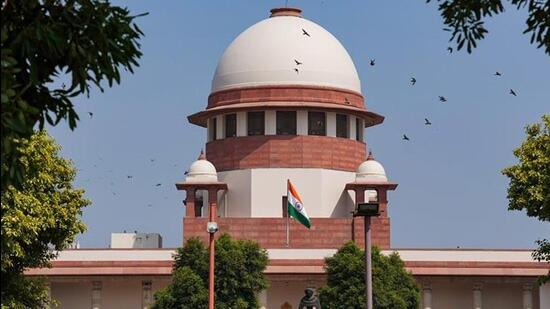Let collegium system not be derailed, we are ‘most transparent institution’: SC
The bench’s comments on the collegium system and its transparency closely follows Union law minister Kiren Rijiju’s relentless reproach of the collegium system, which he has over the last one month at different instances described as “opaque”
Calling itself the “most transparent institution”, the Supreme Court (SC) on Friday said the collegium system should not be derailed on the basis of statements of “some busybody.”

The top court disapproved of adverse comments made by its former judges against the selection mechanism of the collegium, terming it a “fashion”.
“Let the system which is functioning not be derailed,” said a bench of justices MR Shah and CT Ravikumar, as it reserved its judgment on a plea demanding information about a 2018 collegium meeting.
Also Read:Dr LM Singhvi Memorial Lecture: Doctrine of separation of power fundamental to our governance, says V-P Dhankhar
While the petitioner’s lawyer Prashant Bhushan argued that the SC was not being transparent by not disclosing any detail whatsoever about the December 12, 2018 collegium meeting in which the “decision” to elevate two high court judges to the top court was reportedly taken, the bench was emphatic the recommendation was not a “decision in writing”.
“Collegium does not function at the wishes of a busybody...it must have been an oral thing. The decision must not have been converted into writing. So many things are discussed in the collegium...We are the most transparent institution,” retorted Justice Shah, who is also currently a member of the five-judge collegium in the apex court.
The bench’s comments on the collegium system and its transparency closely follows Union law minister Kiren Rijiju’s relentless reproach of the collegium system, which he has over the last one month at different instances described as “opaque”, “alien to the Constitution” and the only system in the world where judges appoint people who are known to them.
While Rijiju’s comments were tacitly responded to by Chief Justice of India Dhananjaya Y Chandrachud by making an appeal for “constitutional statesmanship” by the executive and judiciary as he spoke at the Constitution Day function on November 25, a bench led by justice Sanjay Kishan Kaul disapproved of Rijiju’s public stance on the collegium during a hearing on November 28 and underlined that the Centre is bound to “observe the law of the land” and cannot “frustrate the entire system” of making judicial appointments.
A day after the court’s tirade, the government appointed two new judges in the Bombay high court, but only after having returned 19 older recommendations, including 10 names that were reiterated by the collegium, on November 25.
Justice Kaul’s bench will take up the matter relating to the delay on the part of the government in clearing names again on December 8.
Also Read: Delhi civic polls: SC dismisses plea seeking stay on elections as ‘infructuous’
Meanwhile, appearing for RTI activist and petitioner Anjali Bhardwaj before the court on Friday, Bhushan cited statements and press reports quoting former Supreme Court judge Madan B Lokur according to which the collegium resolution was not uploaded on the SC website despite a decision taken at the meeting on December 12, 2018, to elevate justice Pradeep Nandrajog, the then chief justice of the Rajasthan high court, and justice Rajendra Menon, the then chief Justice of the Delhi high court, as judges to the top court.
According to the reports, Justice Lokur, who retired on December 30, 2018, and reportedly took part in the collegium meeting that approved the names of the two high court chief justices, said he was “disappointed” that the decision taken by the collegium on December 12, 2018, was not “followed and put out.”
However, the bench on Friday took a dig at the remarks made on the collegium by the former Supreme Court judges, especially those who were a part of the collegium during their tenure and participated in the decision-making.
“We don’t want to comment on anything said by former members. Nowadays, it has become a fashion for the former members to comment upon the decision when they were part of the collegium,” remarked the bench, refusing to pay heed to Bhushan’s emphasis on justice Lokur’s statements.
Bhardwaj approached the SC against the denial of information to her by the top court’s administration regarding the agenda and other pertinent information about the December 2018 collegium meeting. Her appeals before the Central Information Commission and the Delhi high court also failed to elicit any positive response.
The Delhi high court, meanwhile affirming the decision of the public information officer of the SC administration earlier this year, held that in the absence of any formal resolution being adopted and signed by the members of the SC collegium for the said meeting, the authorities rightly took the position that there was no material liable to be disclosed. Further, it said that “unsubstantiated and unverified” press reports cannot be taken cognisance of.
According to former CJI Ranjan Gogoi’s autobiography ‘Justice for the Judge’, the names of the two high court chief justices received a favourable opinion for their elevation to the SC in the collegium meeting on December 12, 2018. The matter allegedly got leaked after which the issue was kept in abeyance. After the retirement of justice Lokur, the new collegium met in January 2019 but it did not find favour with the two names recommended earlier, according to the book.





